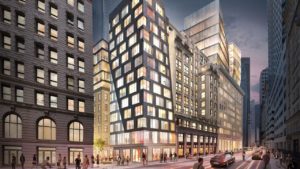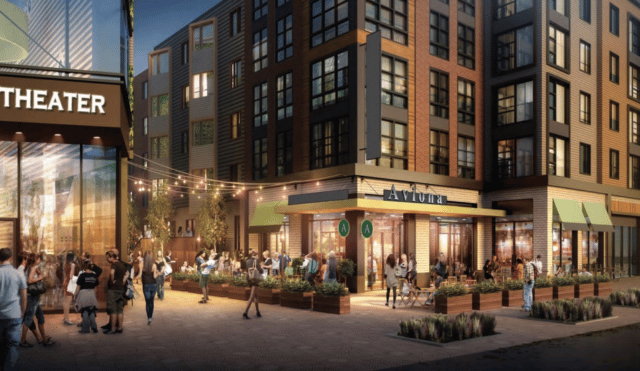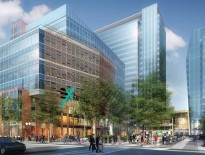
A Hyatt Centric hotel scheduled to open in 2019 will add 163 rooms in the heart of Boston’s Financial District.
In the commercial real estate world, one could say the retail sector’s loss was the industrial sector’s gain in 2018. The same can’t be said for the hotel sector, where most everyone’s gains contributed to the hospitality industry’s growth last year.
Unless there’s a dramatic change in the economy, industry experts say to look for more of the same for all three sectors in 2019: The retail sector hobbling along and adapting due to fierce e-commerce competition, the warehouse sub-sector of the industrial market booming thanks to e-commerce, and hotels remaining strong as long as the economy remains robust.
As for the retail-warehouse connection, Cathy Minnerly, executive vice president at Colliers International, remembers when warehouses were considered the dull, unsexy, overlooked subsector of the almost equally overlooked industrial market in the Greater Boston.
No longer. The warehouse sector is hot – so hot that developers literally can’t build enough product to satisfy the strong demand from e-commerce companies like Amazon, and third-party-logistics firms that handle storage and distribution for other e-commerce firms. These clients need space to store their goods – and to easily access them for distribution to consumers at a moment’s notice.
“Everyone today wants their items right away,” says Minnerly of the e-commerce business. “You have to have the products nearby for them.”
Thus the boom in the warehouse subsector, driven by high demand and low supply in the Boston area. Minnerly estimates that lease prices for warehouse space have jumped 20 to 25 percent in the past 18 months alone in the Boston area.
Meanwhile, developers are trying to build as much Class A warehouse space as they can. An estimated 2.6 million square feet of space are now either under construction or permitted for construction in towns such as Bellingham, Franklin and Norton, Minnerly notes.
Frank Petz, a JLL managing director and head of the firm’s capital market group in the region, said new warehouse space is also coming online in Taunton, Northborough and other towns – and it’s still not enough.
“We’re not overbuilding,” he said. “The demand is there. It’s very high. It’s all due to e-commerce. It’s all about delivering (customer) orders within an hour.”

Developer Edens is expanding Boston’s South Bay center with new retail space, 475 apartments, a hotel and 12-screen AMC Theatre.
Retail Landlords Lean On Food, Fitness
As for the retail sector, e-commerce is having the opposite effect: It’s biting deep into business, with some major brick-and-mortar retailers going out of business (Toys R Us) or declaring bankruptcy (Sears) in 2018, leaving huge vacancies at area malls and even in smaller spaces in downtown areas of smaller cities and towns.
“It’s been challenging,” said Mark Vaughan, a senior partner specializing in retail at the Riemer & Braunstein law firm in Boston. “The evolution of retail continues.”
Retail property owners are responding in a number of ways, particularly by repositioning their holdings from strict retail outlets to more mixed-use properties with restaurants, entertainment venues, and outdoor spaces and events.
“I call it ‘fun, food and fitness,’” Vaughan said of the new type of tenants and activities that retail property owners are trying to introduce.
Simon Property Group, for instance, is currently transforming empty Sears space at the Burlington Mall into a mixed-use complex, he notes.
Edens LLC is in the planning stages of making similar changes at the Woburn Mall. And Edens continues to introduce new shops, restaurants and outdoor improvements in an expansion of its South Bay property in Dorchester.
In Hanover, PECO Real Estate is planning similar changes at the old Hanover Mall – and adding possibly residential components to what’s now being called “Hanover Crossing.”
It’s all driven by the e-commerce onslaught – and retail property owners responding to that market reality, Vaughan said. And that story won’t change in 2019, he added.
World Series a Hit With Hub Hotels
As for the local hotel industry, the past year started off slow, with the revenue per available room (RevPAR) rate actually falling a bit in the Boston-Cambridge market.
But Sebastian Colella, vice president at the Boston-based Pinnacle Advisory Group, said the market came roaring back in late summer and fall. The Red Sox playoffs and World Series run drove demand for hotel rooms in September and October. And the Merrimack Valley natural gas line disaster required the assignment of thousands of workers to help with recovery efforts.
The net result, if trends hold through in the last weeks of 2018, is a record Cambridge-Boston occupancy rate of 82.5 percent, Colella said.
In the suburbs, hotel occupancy rates are running in the 70 to 75 percent range, which is considered “very strong” by industry standards, said Denny Meikleham, a managing director at HFF in Boston.
“All in all, the Boston and New England markets have been very, very healthy,” he said.
And that means a healthy production of new product in recent years, particularly in the Boston-Cambridge hotel market despite the high cost of land, labor and construction materials in the area.
In 2018, the Boston-Cambridge market saw the opening of the Marriott Courtyard across from North Station and an AC Hotel in the Ink Block development in the South End, among other new offerings.
In 2019, the market is bracing for the opening of the 163-room Hyatt Centric hotel at Congress Square in the Financial District, the 211-room Four Seasons at the new One Dalton and the 150-room Cambria hotel in South Boston.
In all, eight new hotels with 1,580 rooms are expected to open in the Boston-Cambridge market in 2019, putting price pressures on all hotels in the area, Colella said.
“It comes with some concerns,” he said of the new hotels. “But the market will absorb it. The industry is quite strong here.”




 |
| 
